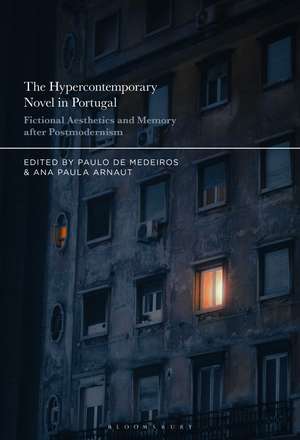The Hypercontemporary Novel in Portugal: Fictional Aesthetics and Memory after Postmodernism
Editat de Dr. or Prof. Paulo de Medeiros, Dr. or Prof. Ana Paula Arnauten Limba Engleză Hardback – 7 feb 2024
Preț: 466.28 lei
Preț vechi: 645.61 lei
-28% Nou
Puncte Express: 699
Preț estimativ în valută:
89.23€ • 92.59$ • 74.58£
89.23€ • 92.59$ • 74.58£
Carte tipărită la comandă
Livrare economică 17-31 martie
Preluare comenzi: 021 569.72.76
Specificații
ISBN-13: 9798765100318
Pagini: 192
Ilustrații: 10 bw illus
Dimensiuni: 152 x 229 x 17 mm
Greutate: 0.43 kg
Editura: Bloomsbury Publishing
Colecția Bloomsbury Academic
Locul publicării:New York, United States
Pagini: 192
Ilustrații: 10 bw illus
Dimensiuni: 152 x 229 x 17 mm
Greutate: 0.43 kg
Editura: Bloomsbury Publishing
Colecția Bloomsbury Academic
Locul publicării:New York, United States
Caracteristici
Offers a unique and potentially transformative theory of the hypercontemporary novel, or the directions taken by literary fiction in the 'post-post-modern' era
Notă biografică
Ana Paula Arnaut is Professor of Portuguese Contemporary Literature at the Faculty of Letters of the University of Coimbra, Portugal. She is a member of the Centre of Portuguese Literature, and her main fields of research are postmodernism and hypercontemporary in Portuguese Literature, colonial and postcolonial studies, and women's studies. She has published several books and articles both in national and international journals.Paulo de Medeiros is Professor of Modern & Contemporary World Literatures in the Department of English and Comparative Literary Studies at the University of Warwick, UK. Previously he held the Chair of Portuguese Studies at Utrecht, the Netherlands, and was President of the American Portuguese Studies Association. He is co-editor of a volume of essays on Luso-African film (2021) and author of two books on Fernando Pessoa, besides work on comparative literature.
Cuprins
List of ContributorsAcknowledgementsIntroductionAna Paula Arnaut (University of Coimbra, Portugal) and Paulo de Medeiros (University of Warwick, UK)Part I. Intermediality, Intertextuality, and Self-Reflexivity in the Hypercontemporary Novel1. The Page as a Hyperfictional Hypothesis in New Portuguese Literature: Patrícia Portela and Joana Bértholo, a Case StudySofia Madalena G. Escourido (University of Coimbra, Portugal)2. Astronomia by Mário Cláudio: Memory, Intermediality, and the Cosmic ImaginationJoão Faustino (University of Warwick, UK)3. Sketching Gnaisse: The Process of Reading a Metamorphic Novel Daniela Côrtes Maduro (University of Coimbra, Portugal)4. Representations of Elsewhere and New Forms of Dystopia in Hypercontemporary Portuguese LiteratureSilvia Amorim (Bordeaux Montaigne University, France)5. Charon Awaits: Do All Things Come to Those Who Wait?Ana Isabel Martins (University of Rennes, France)Part II. Memory and Post-Memory in the Hypercontemporary Novel6. 'What's in a Name?' Reading the HypercontemporaryIsabel Cristina Rodrigues (University of Aveiro, Portugal)7. Paulo Faria's Wars: Owning Experience, Violence, and PostmemoryFelipe Cammaert (University of Coimbra, Portugal)8. The Attraction of Autofiction in Contra mim: Paths and Chasms of MemoryJosé Vieira (University of Coimbra, Portugal)9. The Shattered Narrative of Mafalda Ivo CruzPaulo Ricardo Kralik Angelini and Samla Borges Canilha (Pontifícia Universidade Católica do Rio Grande do Sul, Brazil)10. Of Technology and Lost Connections.: A Decolonial Approach to As Telefones by Djaimilia Pereira de Almeida as a Hypercontemporary NovelEmanuelle Santos (University of Birmingham, UK)11. Through a Glass Darkly: Violence, Intimacy, and Memory in Dulce Maria CardosoPaulo de Medeiros (University of Warwick, UK)Index
